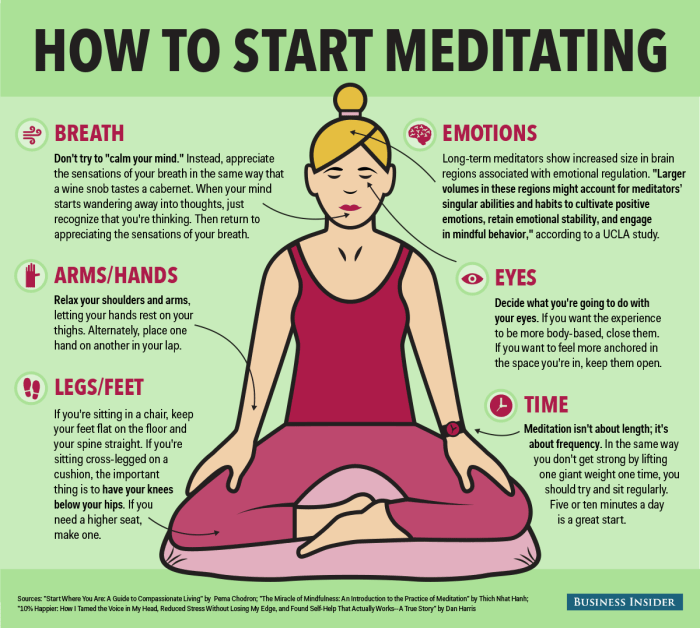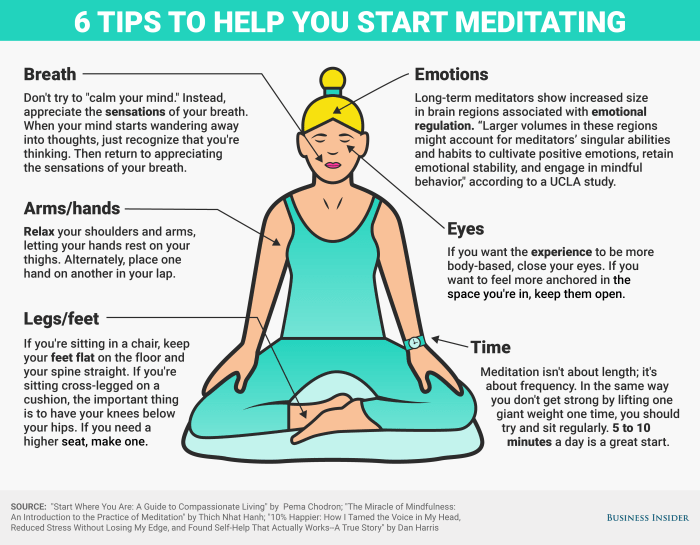How to Meditate for Creating a Daily Practice that Lasts introduces readers to the essential aspects of establishing a consistent meditation routine, delving into the benefits, challenges, and strategies that shape this transformative practice.
Explore the intricacies of setting up a meditation space, establishing a routine, mastering techniques, tracking progress, staying motivated, and overcoming obstacles in this comprehensive guide.
Introduction to Meditation

Meditation is a practice that involves focusing the mind on a particular object, thought, or activity to achieve a state of mental clarity and emotional calmness. It has been practiced for centuries and is known for its numerous benefits for overall well-being.
Creating a daily meditation practice is essential to experience the full benefits of meditation. Consistency is key in reaping the rewards of a clear mind, reduced stress, and improved emotional balance. By incorporating meditation into your daily routine, you can cultivate a sense of inner peace and mindfulness that can positively impact various aspects of your life.
The Benefits of Meditation
- Mental Clarity: Meditation helps to clear the mind of cluttered thoughts and distractions, allowing for improved focus and concentration.
- Emotional Well-Being: Regular meditation practice can reduce stress, anxiety, and negative emotions, promoting a sense of calm and inner peace.
- Physical Health: Meditation has been linked to lower blood pressure, improved sleep, and enhanced immune function, contributing to overall physical well-being.
- Self-Awareness: Through meditation, individuals can develop a greater understanding of their thoughts, emotions, and behaviors, leading to personal growth and self-improvement.
Setting Up a Meditation Space

Creating a dedicated meditation space at home can significantly enhance your practice by providing a serene and comfortable environment for reflection and mindfulness. Having a designated area for meditation helps establish a routine and signals to your mind that it is time to focus and be present.
Tips for Creating a Serene Meditation Space
- Choose a quiet area in your home where you won’t be easily distracted.
- Clear the space of clutter and ensure it is clean and inviting.
- Add elements that promote relaxation, such as soft lighting, calming colors, and natural materials.
- Consider incorporating items like candles, essential oils, or incense to create a soothing atmosphere.
- Use cushions or a meditation mat to make sitting for extended periods more comfortable.
Significance of a Dedicated Meditation Area
A dedicated meditation space serves as a physical reminder of your commitment to mindfulness and self-care.
Creating a designated area for meditation helps to separate your practice from the distractions of daily life, making it easier to focus and center yourself.
Ideas for Incorporating Elements in Your Meditation Space
- Hang inspiring artwork or quotes on the walls to create a sense of peace and motivation.
- Include plants or natural elements to bring a sense of tranquility to the space.
- Play soft music or nature sounds to enhance the ambiance and drown out background noise.
- Consider adding a small fountain or salt lamp for a calming visual and auditory effect.
Establishing a Routine

Establishing a consistent routine is crucial for reaping the full benefits of meditation. Regular practice allows you to deepen your focus, cultivate mindfulness, and experience long-term positive effects on your mental and emotional well-being. Here are some strategies to help you integrate meditation into your daily schedule and overcome common obstacles that may arise.
Importance of Consistency
Maintaining a daily meditation practice helps train your mind to be more present and focused throughout the day. Consistency allows you to build momentum and progress in your practice, leading to a deeper sense of calm and clarity over time. Just like any other skill, meditation requires regular practice to see significant improvements in your mental state and overall quality of life.
- Set a specific time: Choose a time of day that works best for you, whether it’s early morning, during lunch break, or before bed. Consistency in timing helps establish a habit and ensures you prioritize meditation daily.
- Create a dedicated space: Designate a quiet and peaceful corner in your home where you can meditate without distractions. Having a dedicated meditation space makes it easier to commit to your practice regularly.
- Start small: If you’re new to meditation, begin with just a few minutes each day and gradually increase the duration as you become more comfortable. Consistency in short sessions is more effective than sporadic longer sessions.
Overcoming Common Obstacles, How to Meditate for Creating a Daily Practice that Lasts
Despite the benefits of meditation, maintaining a routine can be challenging due to various obstacles that may arise. Here are some tips to help you overcome common hurdles and stay committed to your practice.
- Address resistance: Acknowledge any resistance or excuses that arise when it’s time to meditate. Remind yourself of the positive impact meditation has on your well-being and commit to showing up for yourself each day.
- Adapt to changes: Life can be unpredictable, and your daily schedule may shift unexpectedly. Be flexible in adapting your meditation practice to accommodate changes in your routine without skipping sessions altogether.
- Seek accountability: Share your meditation goals with a friend, family member, or meditation group to hold yourself accountable. Having a support system can motivate you to stick to your routine even when motivation wanes.
Techniques for Effective Meditation

Meditation techniques vary in their approach and focus, allowing individuals to choose one that resonates with their needs and preferences. It is essential to explore different techniques to find the one that suits you best, whether it be mindfulness, loving-kindness, or guided meditation.
Seeking happiness and overall well-being? Meditation could be the key to unlocking a more positive outlook on life. By incorporating mindfulness practices into your daily routine, you can enhance your emotional well-being and find greater peace of mind. For tips on how to meditate for happiness and well-being, be sure to explore this helpful resource: How to Meditate for Happiness and Well-Being.
Mindfulness Meditation
Mindfulness meditation involves focusing on the present moment without judgment. It requires paying attention to your thoughts, emotions, and sensations as they arise, allowing you to cultivate awareness and acceptance. To practice mindfulness meditation, find a quiet space, sit comfortably, and bring your attention to your breath or a specific focal point. When distractions arise, gently redirect your focus back to the present moment.
When it comes to building confidence and self-esteem, meditation can be a powerful tool. By practicing mindfulness and self-reflection, you can cultivate a sense of inner strength and belief in yourself. If you’re interested in learning more about how to meditate for building confidence and self-esteem, check out this insightful guide: How to Meditate for Building Confidence and Self-Esteem.
Loving-Kindness Meditation
Loving-kindness meditation, also known as Metta meditation, involves cultivating feelings of love, compassion, and goodwill towards oneself and others. This practice helps promote positive emotions and empathy. To practice loving-kindness meditation, find a comfortable posture, close your eyes, and repeat phrases of kindness and well-being towards yourself and others. Visualize sending love and compassion to yourself, loved ones, and even those you may have difficulties with.
Not a fan of sitting cross-legged? No problem! There are plenty of alternative meditation positions that can work just as effectively. Whether you prefer lying down, standing, or even walking, you can still reap the benefits of a regular meditation practice. To discover how to meditate without sitting cross-legged, be sure to check out this informative article: How to Meditate Without Sitting Cross-Legged.
Guided Meditation
Guided meditation involves following the instructions of a teacher or recorded audio to support your meditation practice. It can be beneficial for beginners as it provides structure and guidance throughout the session. Guided meditations can focus on relaxation, visualization, mindfulness, or other themes. To practice guided meditation, find a quiet space, play the guided meditation audio, and follow along with the instructions provided.Choosing a meditation technique that resonates with you depends on your preferences, goals, and comfort level.
Experiment with different techniques to see which one feels most supportive and effective for you. Remember that consistency is key to developing a daily meditation practice. Here are some tips for beginners to stay focused and avoid distractions during meditation:
- Avoid meditating in a noisy or cluttered environment. Find a quiet and peaceful space where you can relax and focus.
- Set a specific time each day for meditation to establish a routine and make it a habit.
- Start with short meditation sessions and gradually increase the duration as you build your practice.
- Use props like cushions or chairs to support your posture and make meditation more comfortable.
- If distractions arise, acknowledge them without judgment and gently bring your focus back to your breath or chosen focal point.
Tracking Progress and Staying Motivated
Tracking your progress in meditation practice is essential for several reasons. It allows you to see how far you have come, identify patterns in your practice, and make adjustments as needed. Monitoring your daily meditation sessions helps you stay accountable to your commitment and motivates you to continue your practice regularly.
Methods for Monitoring Daily Meditation Sessions
- Keep a meditation journal: Record the duration of each session, how you felt before and after, any distractions that arose, and any insights or thoughts that came up.
- Use a meditation app: There are several apps available that allow you to track your meditation sessions, set goals, and receive reminders to meditate daily.
- Utilize a calendar: Mark off each day that you meditate on a physical or digital calendar to visually see your progress over time.
Strategies for Staying Motivated and Committed
- Set realistic goals: Start with achievable goals and gradually increase the duration or frequency of your meditation sessions as you progress.
- Find a meditation buddy: Partnering with someone who shares your meditation goals can help keep you motivated and accountable.
- Reward yourself: Celebrate your milestones, whether it’s reaching a certain number of consecutive days of meditation or noticing improvements in your mental well-being.
- Practice self-compassion: Understand that meditation is a journey, and there may be days when your practice feels challenging. Be kind to yourself and acknowledge your efforts, regardless of the outcome.
Overcoming Challenges: How To Meditate For Creating A Daily Practice That Lasts

When establishing a daily meditation practice, individuals often face common challenges that can hinder their progress. These challenges may include distractions, lack of motivation, restlessness, or difficulty in focusing. Overcoming these obstacles is essential to maintain a consistent meditation routine and experience the full benefits of the practice.
Dealing with Distractions
Distractions are a common challenge during meditation, as external noises, racing thoughts, or physical discomfort can disrupt the practice. To address this challenge, individuals can try the following strategies:
- Acknowledge the distraction without judgment and gently redirect your focus back to your breath or mantra.
- Use earplugs or white noise machines to minimize external noises that may interfere with your meditation.
- Practice mindfulness throughout the day to cultivate a greater awareness of your thoughts and emotions, making it easier to let go of distractions during meditation.
- Experiment with different meditation techniques, such as guided meditation or walking meditation, to find one that resonates with you and helps you stay focused.
Boosting Motivation
Lack of motivation can also be a significant challenge when establishing a daily meditation practice. To overcome this obstacle, consider the following tips:
- Set realistic goals and start with a manageable amount of time for meditation each day, gradually increasing the duration as you build consistency.
- Find a meditation buddy or join a meditation group to stay accountable and motivated through community support.
- Remind yourself of the benefits of meditation, such as reduced stress, improved focus, and increased emotional well-being, to stay inspired and committed to your practice.
- Create a peaceful and inviting meditation space that encourages relaxation and helps you look forward to your daily practice.
Benefits of Perseverance
Perseverance is crucial in overcoming obstacles in meditation because it cultivates resilience, patience, and inner strength. By persisting through challenges and maintaining a consistent practice, individuals can experience the following benefits:
- Improved focus and concentration as you learn to navigate distractions and stay present during meditation.
- Enhanced emotional regulation and stress management skills, leading to greater overall well-being and resilience in the face of daily stressors.
- Deepened self-awareness and insight as you develop a more profound connection with your inner self through regular meditation practice.
- Greater peace of mind and a sense of inner calm that can positively impact your relationships, work performance, and overall quality of life.
In conclusion, mastering the art of meditation requires dedication, patience, and a willingness to confront challenges head-on. By embracing the journey towards a lasting daily practice, individuals can unlock a profound sense of peace, clarity, and well-being in their lives.